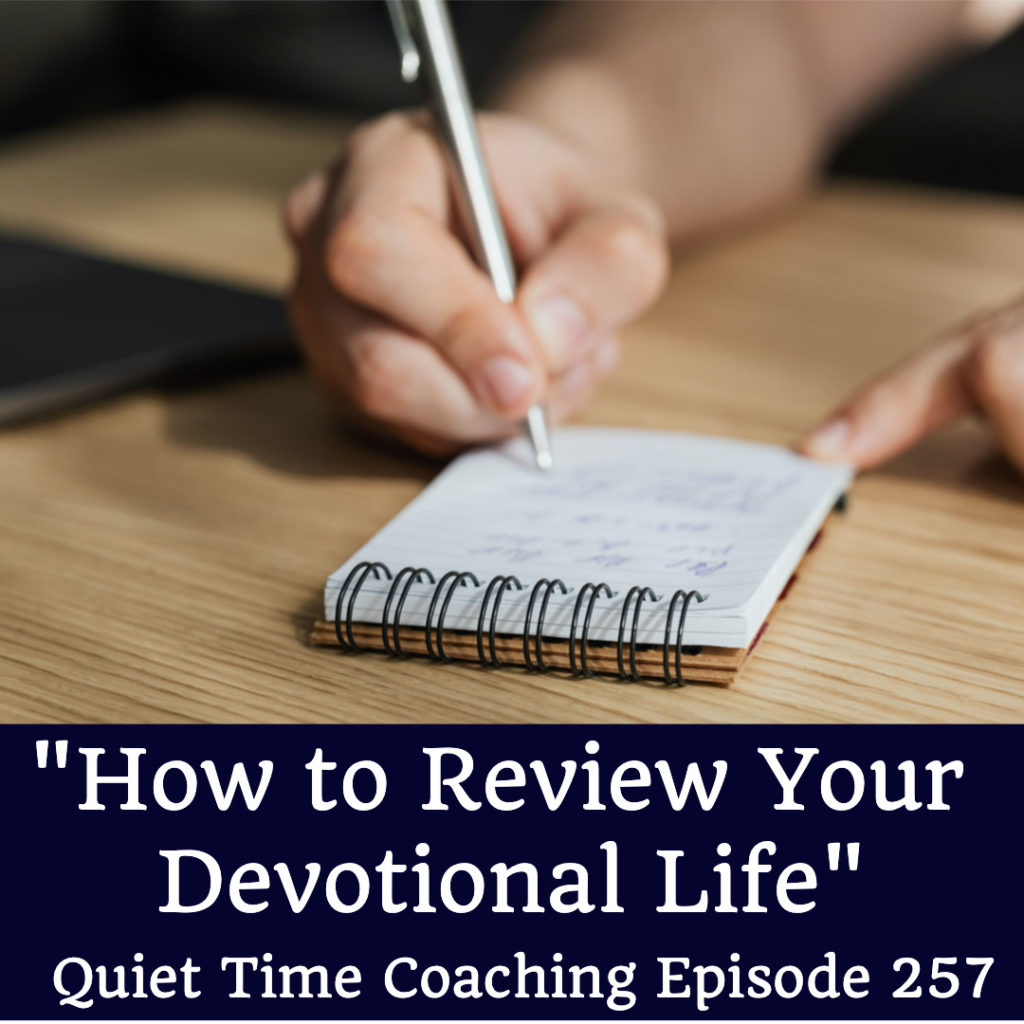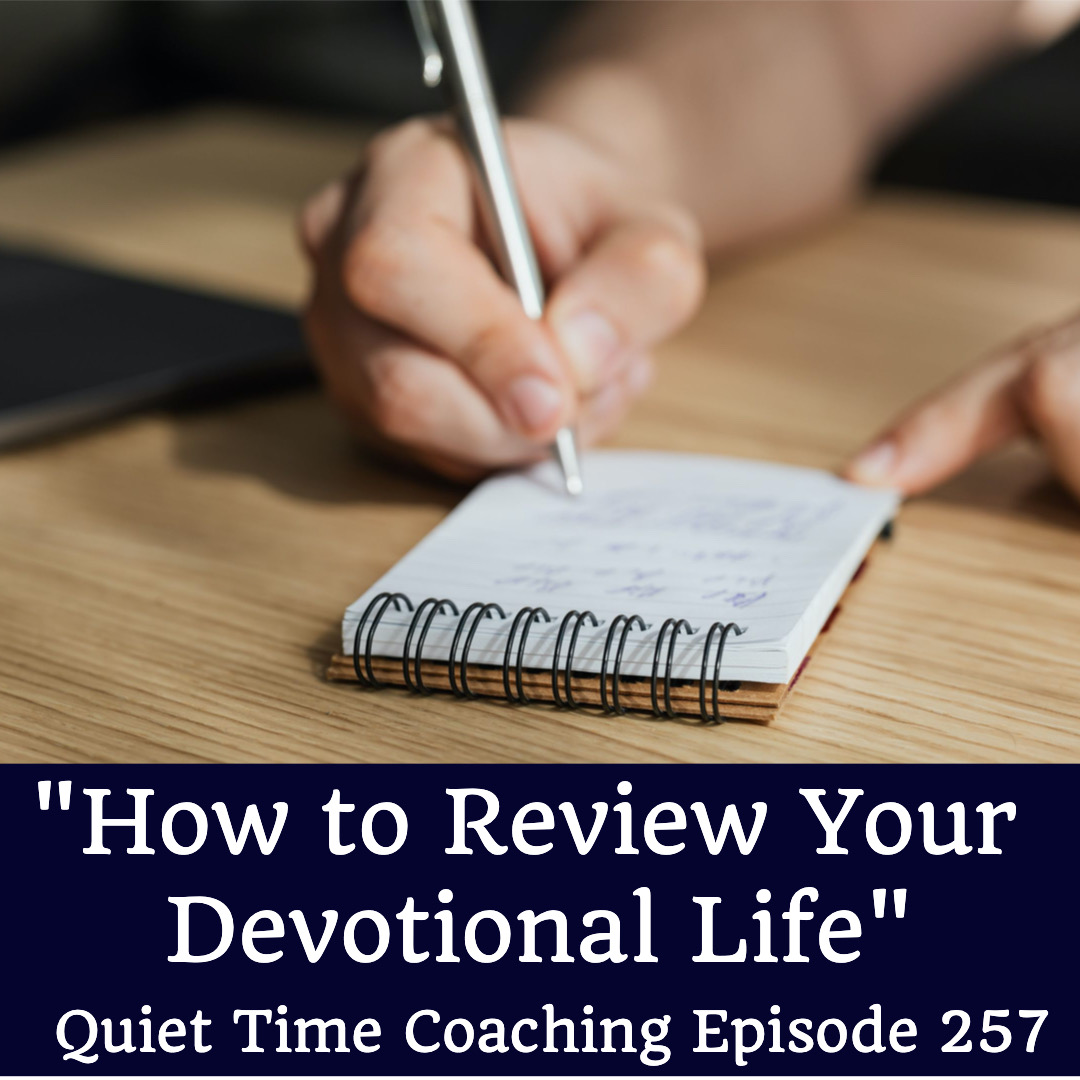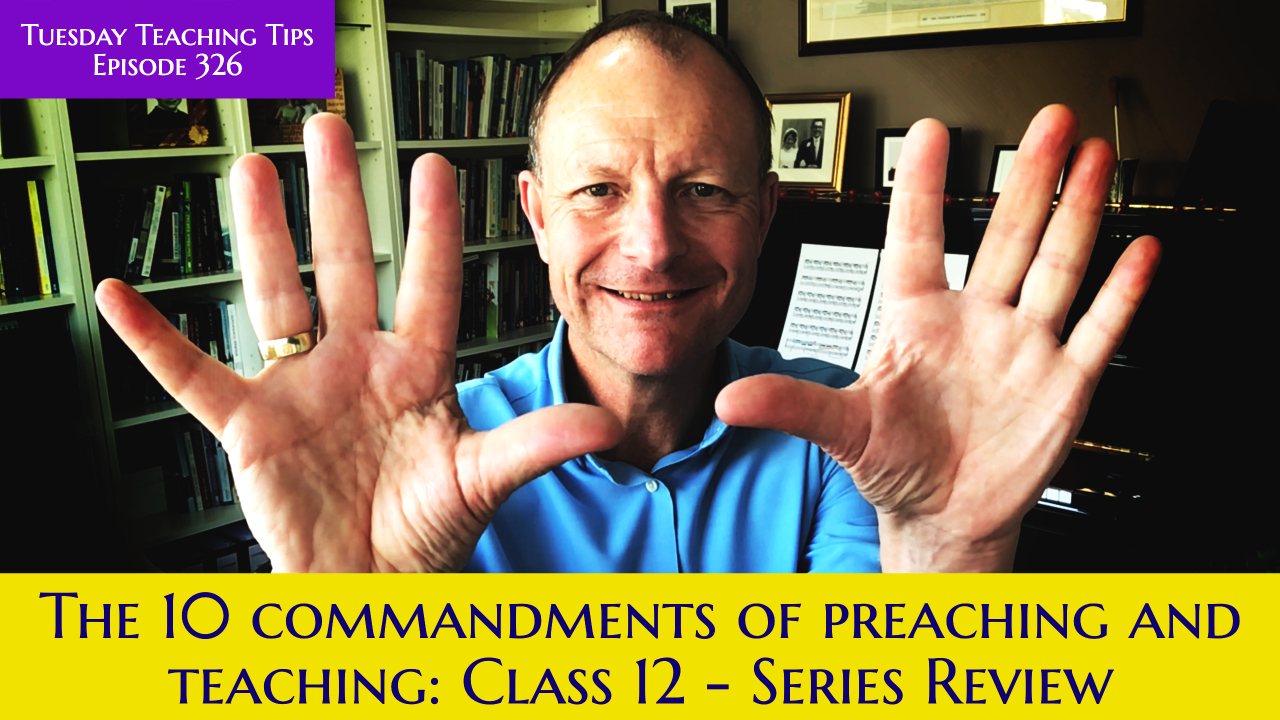Quiet Time Coaching Episode 257

This podcast is going live on Christmas Eve. Truthfully, the principles could be used on any occasion, but there are times to take stock.
The story is told of the teacher passed over for promotion year after year. Finally, she confronted her line manager and asked, “I’ve been teaching for 25 years and never been promoted. I have two and a half decades of experience. I deserve to be promoted.” Her manager replied, “You don’t have 25 years of experience. You have one year of experience repeated 25 times.” Just because we pray week by week, year by year does not mean we are drawing closer to the heart of our heavenly father. Simply because we read our Bible does not mean we are Becoming more secure in the love of Christ. Just because we sing psalms, hymns and spiritual songs, does not mean that we are more in touch with the presence and power of the Spirit.
My intention with this podcast is not to laden us with guilt or fear. Instead, my hope is that we will find an honest assessment of our devotional life to be a liberating and joyous practice.
Join me today as we consider a healthy way to assess the quality of our devotional life.
We should begin by making sure we understand what we’re talking about. By ‘devotional life’, I’m talking about our focused times of connection with God. What we often call our ‘quiet times’. Those moments when we stop to pray, read God’s Word or simply rest in silence in his loving presence.
Can we grow in our relationship with God? The apostle Peter seemed to think so:
“But grow in the grace and knowledge of our Lord and Savior Jesus Christ. To him be glory both now and forever! Amen.” (2 Peter 3:18 NIV11)
It’s hard to imagine that the Apostles didn’t get to know Jesus better and better during their three years with him. And even after his departure, it seems they continued to grow. Compare the firebrand apostle John with the one who wrote his epistles towards the end of his life:
“When the disciples James and John saw this, they asked, “Lord, do you want us to call fire down from heaven to destroy them?”” (Luke 9:54 NIV11)
“Dear friends, let us love one another, for love comes from God. Everyone who loves has been born of God and knows God.” (1 John 4:7 NIV11)
Now let’s consider an ancient practice and how it might help us in this instance. I’m talking about the ‘Examen’.
The Examen
What is this thing? I am not sure its origins can be fully traced, but it was apparently popularised by Ignatius of Loyola in the 1500s. The concept, briefly, is to take some focussed time to consider what has been going on, what is going on, what God has been doing, and finding refreshment to go forward.
And example which comes to mind is that of Elijah. God gave him the opportunity for an examen whilst he was in that cave in the mountains. See, 1 Kings 19:3-19.
The examen can be used on a daily basis. Here however, we will use it to think about the year in its entirety.
To do this properly, I recommend sending aside at least an hour, preferably more. Find a place where you won’t be disturbed. Turn off your phone, get rid of all gadgets which might try to steal your attention and take something with which to write down your thoughts – preferably pen and paper rather than something electronic. Let your friends and family know that you’re not to be disturbed. You will probably find it helpful to have your diary to hand to remind you of your year.
Now that you are ready, proceed through this four-step process.
1. Replay
Think through the highs and lows of your devotional life this year. Those times of delightful prayer, and those times of dryness. The moments of lament and laughter.
Ask yourself where God showed up. Where and when was his immanence part of your experience?
In his book on prayer, Pete Greg put it like this, quoting a Jesuit. It’s like:
‘rummaging for God. Going through a drawer full of stuff, feeling around, looking for something that you are sure must be there.’
Greig, Pete. How to Pray: A Simple Guide for Normal People (p. 150). John Murray Press. Kindle Edition.
What resources made a significant difference to the quality of your times of quiet this year? Was it the Bible you were reading – perhaps a new translation? How about a devotional app, praying with friends or family, listening to a bible podcast, reading books about spiritual disciplines?
Write down everything you can remember which gives you a good picture of the good times with God.
2. Rejoice
Perhaps God surprised you this year.
What there a prayer he answered you weren’t expecting? Did you find something working out about which you had your doubts? Did you find the courage to act with faith when you were concerned you might give in to fear?
Tried to remember all the gifts God gave you this year. Make a list of things large and small with which God blessed you in the last 12 months.
Some of those blessings might have come in disguise. Don’t forget that God is with us in our fears, sins, doubts and painful experiences. Jonah’s prayer in the belly of the fish is one of the most wonderful expressions of rejoicing in one of the worst places imaginable:
“To the roots of the mountains I sank down;
the earth beneath barred me in forever.
But you, LORD my God,
brought my life up from the pit.”……
“But I, with shouts of grateful praise,
will sacrifice to you.
What I have vowed I will make good.
I will say, ‘Salvation comes from the LORD.’ ”” (Jonah 2:6, 9 NIV11)
Write down all the reasons to rejoice.
3. Repent
You probably knew we were going to get to the “repent” phase at some point. Before we get into it, are you afraid of it? Does it give you a nervous twitch? It does for me, from time to time. It’s partly to do with my upbringing, partly my personality, and partly some experiences in church life. However, I must remember something.
God made me capable of repentance because it was something that would do me good.
“Repent, then, and turn to God, so that your sins may be wiped out, that times of refreshing may come from the Lord, and that he may send the Messiah, who has been appointed for you—even Jesus.” (Acts 3:19–20 NIV11)
God it does not consider repentance negative. It is not the way to endear ourselves to him once again. We do not pay any debts by repenting. Those debts have already been paid by Jesus.
What we do by considering our need to repent, noticing areas for repentance, and taking action on them by the power and strength of the Spirit of Christ in us, is to reconnect with the heart of God.
Take some time to consider your feelings this year. And by failings, I mean not living up to the virtuous Christ-like character of Christ in ways that you had hoped to. Not standards imposed by somebody else, but a lifestyle that, at your best, you wholeheartedly wish to embrace.
Write down anything God reveals to you that you would do well to consider turning away from, as you turn towards him.
4. Reboot
We are in the final phase of the examen. Review the first three phases. What are your main lessons from replaying your devotional year? What is on your ‘rejoicing’ list? Where is the room for repentance?
Now that you have those things clear, it’s time to consider the future. Contemplate the year ahead. What is it you sense God drawing you towards in your relationship with him?
Could it be a renewed commitment to intercession in prayer? Perhaps it is an emphasis on silence and solitude, resting in his presence. How about a focus on the Psalms for your spiritual inspiration? Is the Spirit bringing certain parts of the Bible into prominence? Perhaps he is suggesting you study a particular biblical book.
This list is, of course, potentially endless. Which is why it is so important to set aside enough time to pray and think and talk with our abba, father.
Write down anything which crosses your mind. You can always refine it later.
A final word on this process. There is no ‘correct’ way to do the examen. Please do not stress yourself if you find it difficult, or even on helpful. It is simply a tool. Adapt it to your own use. Use the principles that mean most to you, and that you find useful.
Our goal here is simply some sober judgement of the last 12 months, inviting God to give us wisdom about our present state, and filling us with faith for the coming year.
If you have an annual devotional practice which helps you, please let me know. If you try this examen, please let me know how it goes – good or bad!
Please add your comments on this week’s topic. We learn best when we learn in community.
Do you have a question about teaching the Bible? Is it theological, technical, practical? Send me your questions or suggestions. Here’s the email: malcolm@malcolmcox.org.
If you’d like a copy of my free eBook on spiritual disciplines, “How God grows His people”, sign up at my website: http://www.malcolmcox.org.
Please pass the link on, subscribe, leave a review.
“Worship the LORD with gladness; come before him with joyful songs.” (Psalms 100:2 NIV11)
God bless, Malcolm
Note: I modelled the examen technique on Pete Greig’s version in his book “How to pray”.



